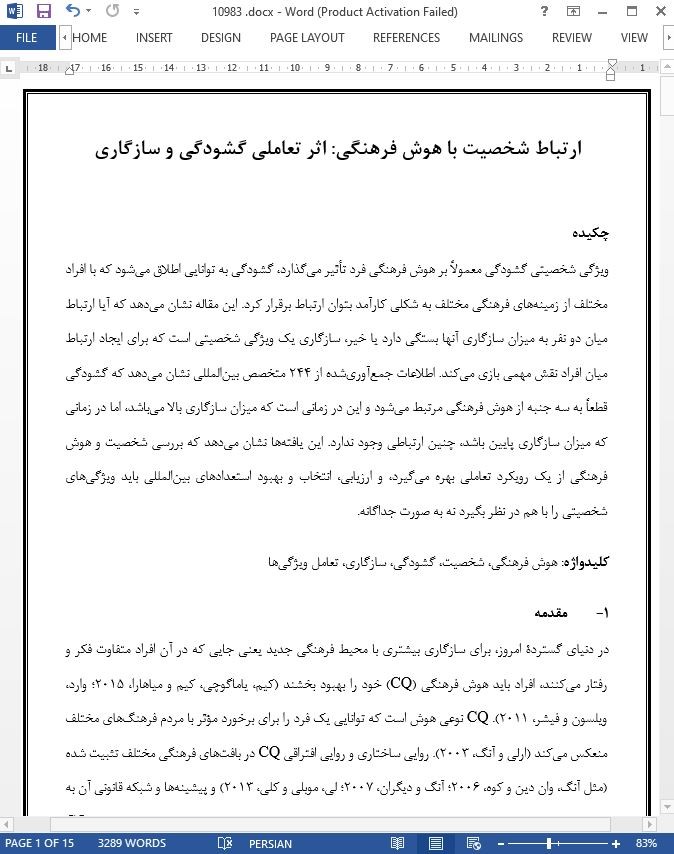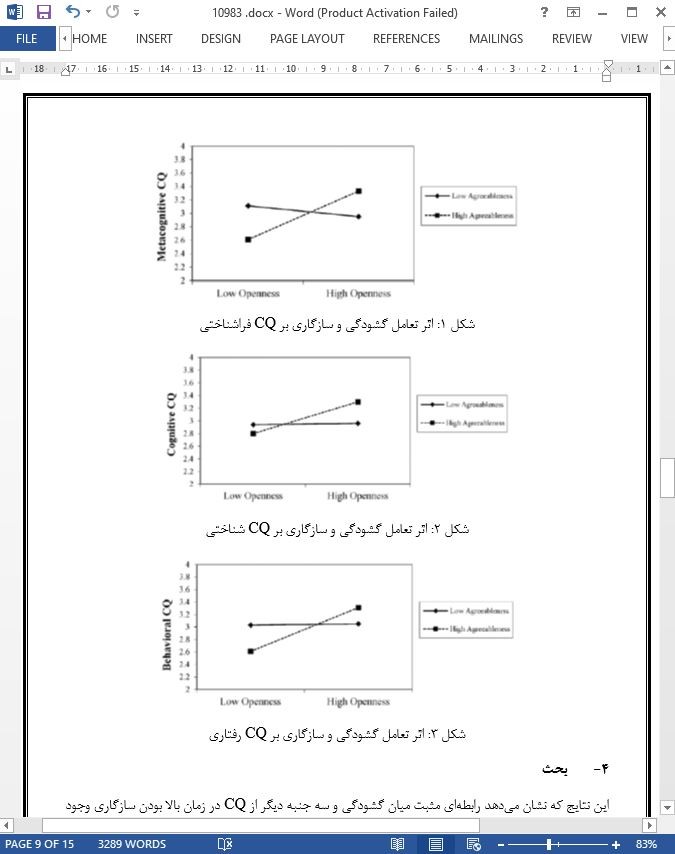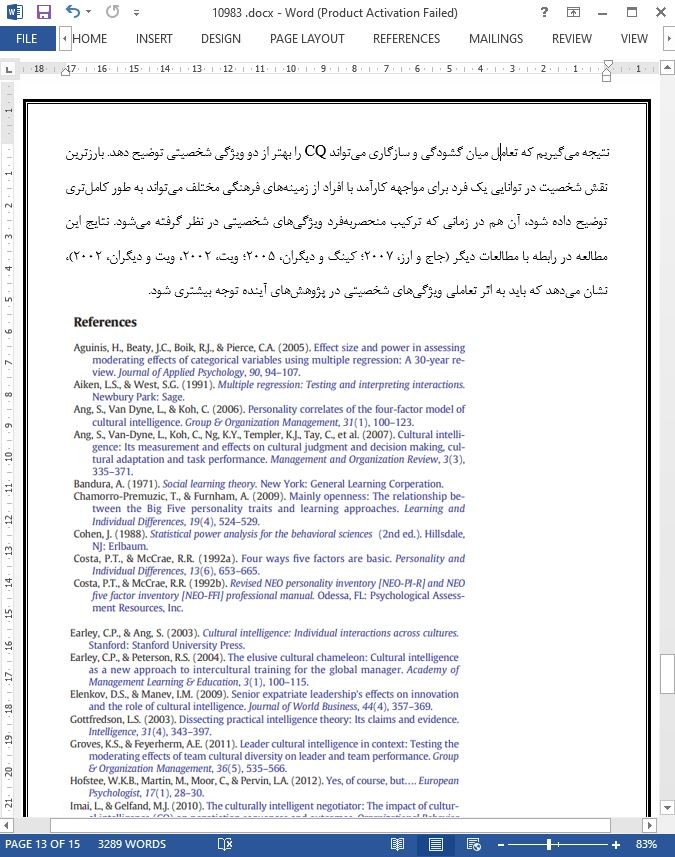
ارتباط شخصیت با هوش فرهنگی: اثر تعاملی گشودگی و سازگاری
چکیده
ویژگی شخصیتی گشودگی معمولاً بر هوش فرهنگی فرد تأثیر می گذارد، گشودگی به توانایی اطلاق می شود که با افراد مختلف از زمینه های فرهنگی مختلف به شکلی کارآمد بتوان ارتباط برقرار کرد. این مقاله نشان می دهد که آیا ارتباط میان دو نفر به میزان سازگاری آنها بستگی دارد یا خیر، سازگاری یک ویژگی شخصیتی است که برای ایجاد ارتباط میان افراد نقش مهمی بازی می کند. اطلاعات جمعآوریشده از 244 متخصص بین المللی نشان می دهد که گشودگی قطعاً به سه جنبه از هوش فرهنگی مرتبط می شود و این در زمانی است که میزان سازگاری بالا می باشد، اما در زمانی که میزان سازگاری پایین باشد، چنین ارتباطی وجود ندارد. این یافته ها نشان می دهد که بررسی شخصیت و هوش فرهنگی از یک رویکرد تعاملی بهره می گیرد، و ارزیابی، انتخاب و بهبود استعدادهای بین المللی باید ویژگی های شخصیتی را با هم در نظر بگیرد نه به صورت جداگانه.
1- مقدمه
در دنیای گستردۀ امروز، برای سازگاری بیشتری با محیط فرهنگی جدید یعنی جایی که در آن افراد متفاوت فکر و رفتار می کنند، افراد باید هوش فرهنگی (CQ) خود را بهبود بخشند (کیم، یاماگوچی، کیم و میاهارا، 2015؛ وارد، ویلسون و فیشر، 2011). CQ نوعی هوش است که توانایی یک فرد را برای برخورد مؤثر با مردم فرهنگ های مختلف منعکس می کند (ارلی و آنگ، 2003). روایی ساختاری و روایی افتراقی CQ در بافت های فرهنگی مختلف تثبیت شده (مثل آنگ، وان دین و کوه، 2006؛ آنگ و دیگران، 2007؛ لی، موبلی و کلی، 2013) و پیشینه ها و شبکه قانونی آن به صورتی گسترده مورد بررسی قرار گرفته است. پنج فاکتور ویژگی های شخصیتی به عنوان عوامل تعیین کنندۀ CQ تأیید شده است (آنگ و دیگران، 2006). با این حال، به نحوۀ تعامل ویژگی های شخصیتی با CQ توجهی نشده است. بدون این دانش، ما نقش حیاتی ویژگی های شخصیتی را در افراد دارای صلاحیت فرهنگی برای هدایت ارزیابی، انتخاب و رشد استعدادهای بین المللی به طور کامل درک نمی کنیم. بنابراین، با استناد به تأکید غالب مطالعات قبلی بر پنج ویژگی شخصیتی مستقل و شایستگی های فردی برای اثربخشی در یک زمینه بین المللی، این مطالعه به بررسی تأثیر متقابل ویژگی های شخصیتی گشودگی و سازگاری بر CQ پرداخته است.
4-2- نتیجه گیری
نتیجه می گیریم که تعامل میان گشودگی و سازگاری می تواند CQ را بهتر از دو ویژگی شخصیتی توضیح دهد. بارزترین نقش شخصیت در توانایی یک فرد برای مواجهه کارآمد با افراد از زمینه های فرهنگی مختلف می تواند به طور کامل تری توضیح داده شود، آن هم در زمانی که ترکیب منحصربه فرد ویژگی های شخصیتی در نظر گرفته می شود. نتایج این مطالعه در رابطه با مطالعات دیگر (جاج و ارز، 2007؛ کینگ و دیگران، 2005؛ ویت، 2002، ویت و دیگران، 2002)، نشان می دهد که باید به اثر تعاملی ویژگی های شخصیتی در پژوهش های آینده توجه بیشتری شود.
Abstract
The personality trait of openness is generally believed to influence an individual's cultural intelligence, which is an ability to deal effectively with people from different cultural backgrounds. This study examines whether a relationship between the two depends on the individual's degree of agreeableness, a personality trait important for building interpersonal relationships. Data collected from 244 international professionals shows that openness is positively related to three facets of cultural intelligence when agreeableness is high, but not when agreeableness is low. The findings suggest that research on personality and cultural intelligence would benefit from an interactive approach, and that assessment, selection and development of international talents should consider personality traits not in isolation, but in concert.
1. Introduction
In today's globalized world, individuals need to develop cultural intelligence (CQ) to adapt more effectively to a new cultural setting where people think and behave differently (Kim, Yamaguchi, Kim, & Miyahara, 2015; Ward, Wilson, & Fischer, 2011). CQ is conceptualized as a type of intelligence which reflects an individual's ability to deal effectively with people from different cultural backgrounds (Earley & Ang, 2003). Construct validity and discriminative validity of CQ have been established in various cultural contexts (Ang et al., 2007; Şahin, Gürbüz, Köksal, & Ercan, 2013) and its antecedents and nomological network have been widely studied (e.g., Ang, Van Dyne, & Koh, 2006, Ang et al., 2007, Li, Mobley, & Kelly, 2013). Five factor personality traits are established as determinants of CQ (Ang et al., 2006). However, no attention has been paid to how personality traits interact to influence CQ. Without this knowledge, we do not fully understand the vital role of personality traits in culturally competent individuals to guide the assessment, selection and development of international talents. Therefore, departing from the dominant emphasis of previous studies on independent five factor personality traits and individual's competencies to be effective in an international context, this study examined an interactive effect of openness and agreeableness personality traits on CQ.
4.2. Conclusion
We conclude that the interaction between openness and agreeableness can explain CQ better than the two personality traits in isolation. The most salient role of personality in an individual's ability to deal effectively with people from different cultural backgrounds can only be more fully explained when the unique combination of personality traits is taken into account. The results of this study, in conjunction with other studies (Judge & Erez, 2007; King et al., 2005; Witt, 2002; Witt et al., 2002), suggest that continued attention needs to be given to the interactive effect of personality traits in future research.
چکیده
1- مقدمه
2- روش
2-1 شرکت کنندگان
3- نتایج
4- بحث
4-1- محدودیت ها و تحقیقات آینده
4-2- نتیجه گیری
Abstract
1. Introduction
2. Method
2.1. Participants
3. Results
4. Discussion
4.1. Limitations and future research
4.2. Conclusion
- اصل مقاله انگلیسی با فرمت ورد (word) با قابلیت ویرایش
- ترجمه فارسی مقاله با فرمت ورد (word) با قابلیت ویرایش، بدون آرم سایت ای ترجمه
- ترجمه فارسی مقاله با فرمت pdf، بدون آرم سایت ای ترجمه



